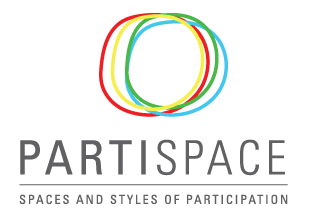Welcome to Partibridges online module on youth participation in Europe!
Each part of the module has been co-constructed by the associations and universities involved in the project.
You can start by clicking in the Partibridges purple hotspot in the map, to see some common themes and contextual elements.
Then click on each purple hotspot to watch the teasers of the four units on youth participation in Europe and to access the rest of the units.
You can also find under the map a glossary of the main theme of the e-training.
If you want to learn more on how to use the e-training and how it has been created, you can have a look at the video recording of our final dissemination event or at the tutorial document.
You can enlarge the map by clicking on the icon in the top right corner.
Map design by Zoé David
Glossary
You can find here some key elements we are addressing throughout our e-training.
You can find the content by clicking directly in the glossary or by looking in the appropriate country unit (FR,PT, TR,UK) in the map, and sequence (Seq1, Seq2 etc.).
A
Adultism – UK Seq1
Anxiety to perform – UK Seq3
B
Banking education (Paulo Freire) – TR Seq2
Barriers that young people can face – UK Seq 5, PT Seq3, FR Seq3
C
Collaboration and co-construction between association and university – PT Seq1, Seq2, Seq3
Collaborative methodologies – PT Seq2 p3
Collective well-being – TR Seq2
Controling youth Participation – UK Seq2
Critical ethnography – PT Seq2
Critical pedagogy, Problem posing education – TR Seq2, FR Seq2
D
Dehierachisation of Knowledges – PT Seq1, TR Seq2
E
Entrepreneur of the self, Self-governing , Life long Learning – UK Seq3
Example of young people actions – TR Seq3
F
Formal, informal, non formal participation – UK Seq1
H
Hope, Collective/Individual – TR Seq1 , Educated Hope – TR Seq2,Seq3, Seq4
I
Importance of neoliberal philosophy in question of participation – UK Seq3
Importance of families in youth participation – FR Seq2&3
Inclusivity and the role of youth worker – UK Seq5
Individual/ Collective Hope – TR Seq1
Individualisation of the engagement – UK Seq3
Informal peer learning – FR Seq2
K
Knoweldge Plurality : scientific, local, traditional … – PT Seq1
L
Lived space, lived territory, importance of the territory in the participation questions – PT Seq 1 p.4, FR Seq2&3
Local context & needs – TR Seq 2, PT Seq2&3, FR Seq2&3, Partibridges hotspot
O
Over-sollicitation of young people – UK Seq3, FR Seq3
P
Participation scale (comprehension grid for participation) – FR Seq1
Participation of marginalized young people – FR Seq3
Participative Action Research – PT Seq2 & You can have a look on our methodological guide and webdocumentary on that point !
Partnership in youthwork – FR Seq3
Public goods and public spheres – TR Seq2
S
Social Participation – FR Seq1
Social construction of Youth : what is youth ? – UK Seq1
Social transformation desire – In the whole e-training!
Spacial justice – PT Seq3, TR Seq3 example 2
Stereotypes on youth (youth as a problem/a solution) – UK Seq1
T
Traditionnal knowledge mapping technic – PT Seq 1
U
Use of public space and participation – Fr Seq2&3
W
What is participation ? – In the whole e-training and more specifically PT Seq3, FR Seq1, UK Seq1
Why involving young people in organizations ? (benefit) – UK Seq5 p7
Y
Young people motivation to participate – TR Seq2&3, FR Seq1 (Participation biographies), UK Seq3&4 (p13-16) (sense of belonging, self-governing…)
Youth work : What is it ? What Values ? – UK Seq4



